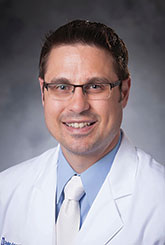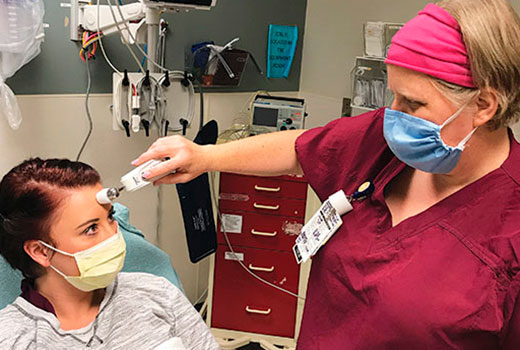Depending on whom one asks and their locality, doctors and nurses are having varied experiences in treating coronavirus. In some places, doctors are grateful for signs as of late that the virus may not be impacting their areas as much as anticipated. In other quarters, the number of cases and those hospitalized with life-threatening symptoms continues to climb. Their need for encouragement and prayer support, though, is something that is universally shared.
“In all honesty, I haven’t seen more than one to three COVID patients per shift during the entire pandemic. Only a handful have been ICU sick,” reported Dr. John Robinson, a hospital emergency room physician in Greenwood. “So, in my experience, it has been nothing like what is being reported on the news or in some of the hotspots,” he added.

“God has allowed this pandemic to occur, and we pray the church will shine during this time, leading many to Christ.”
— Dr. John Robinson
Robinson, who attends Gateway Baptist Church in Irmo and serves on its medical response team, has been practicing medicine since 2006. He is employed at Self Regional Healthcare, a large Level III trauma center that serves seven counties. The hospital’s busy emergency room sees roughly 60,000 patients a year, and during the day, several doctors and mid-level providers, along with about a dozen nurses, take care of 30-plus beds.
The hospital admissions there for COVID peaked in July, Robinson said. Early on, he was concerned about possibly infecting his family, but as time passes his concern is lessening.
“I’m careful at work, but we live our lives as normal at home,” he said.
“We pray daily for protection for all people and healing for those infected,” he added. “God has allowed this pandemic to occur for a reason, and we pray the church will shine during this time, leading many to Christ.”
Dealing with coronavirus patients, though, still takes an emotional toll on doctors and nurses — for whom “corona-weariness” can become very real. “Emotional fatigue is a reality for some,” Robinson acknowledged. “All of my partners are hard-working, well-adjusted and strong in their faith, which I think also makes a difference.”
In Anderson, however, there appears to be a different story at present. Dr. Shane Purcell, who works at Direct Access MD, reported seeing more and more positive cases in the Anderson community, and he noted that the local hospital was one-third full of COVID-positive patients and the ICUs were “busting.”
Purcell, who has been practicing family medicine for 18 years, is not seeing any COVID patients in his office, but rather does telemedicine visits to assess patients and sometimes sees them briefly in the parking lot while wearing personal protective equipment. More and more patients are being sent for testing and getting more positive results, he said.
Treating coronavirus patients, he agreed, can be emotionally draining for medical professionals. Purcell said, “Many of us spend hours every day, trying to calm patient concerns and fears and relaying reassurance. However, saying the same things over and over again like a broken record and continuous education for patients and employers is overwhelming. It’s like the Groundhog Day movie every day.”

“We need prayer for our nurses, doctors and communities — for calm, patience, healing and understanding.”
— Dr. Shane Purcell
One of the best ways churches and pastors can show their support for doctors and nurses in their congregations, he said, is prayer. “We need prayer for our nurses and doctors and for our communities — for calm, patience, healing and understanding,” Purcell said.
Another thing that pastors and churches can do is simply check on their doctors and nurses. Purcell suggested, “Just reach out to them to let them know ‘We are still here for you in this time,’ and maybe consider providing a virtual prayer meeting for the health care workers.”
Just to the north in Durham, N.C., Dr. Jamie Privratsky, who is an ICU physician, an anesthesiologist, and researcher at a large, quaternary-care university medical center, reported that his region saw a dramatic increase a little over a month ago.
“The patients that require a ventilator get very sick, and we have a difficult time with ventilating them and keeping them comfortable and sedated,” Privratsky said. “COVID does not just affect the lungs, but the brain, heart and kidneys as well. It is very serious for those who have severe illness.”
At the time, his region was seeing a high number of hospital patients, but during the most recent increase they have not seen as high of a burden in ICU units as they did during the initial surge, he said.
“After universal masking mandates, we have seen the case burden dropping. Our hospitals are full, but, fortunately in our area, we have never exceeded our capacity to care for our patients,” Privratsky said.
In the early stages of the pandemic, Privratsky said he was more apprehensive because no one really knew much about the virus. “Now that we know more, I have less anxiety — not because it is not serious, but just because we see how some very easy-to-follow precautions (hygiene and masking) can really prevent the spread,” he said.

“As Christians, we need to show that we will care for our neighbor more than our own self-interests.”
— Dr. Jamie Privratsky
“Along these lines, I actually feel safer at work than I do out in the community because we have the proper protection, people wear it, and wear it correctly,” he said. “It is concerning, however, why some people die from it, and some don’t even know they have it.”
“Corona-weariness” and emotional fatigue, he also maintains, is real for those on the frontlines. “I think all of us are sick of hearing about it and talking about it,” Privratsky said. “It is also emotionally draining to always put on a PAPR hood (think space-like suit in the movies) and gown up when seeing COVID patients.
“I think fatigue started to set in when we realized COVID was not going away at all until we have an effective vaccine, and that these precautions were here to stay,” he added.
A small group leader at Summit Church in Durham, Privratsky agreed that prayer is the number one thing that Christians can do to support doctors and nurses. “Pray for wisdom for local, state and national leaders. Pray for unity to combat this and not divisiveness,” he urged.
Beyond that, the best way to show support is to try to decrease the number of patients who need hospital care, he said. “Specifically, I would ask pastors to really challenge their members to be good neighbors, and to ask what that looks like during this time.
“Many Christians say we should not be scared of COVID,” he said. “I agree with that sentiment; however, as Christians we need to show that we will care for our neighbor more than our own self-interests.”

